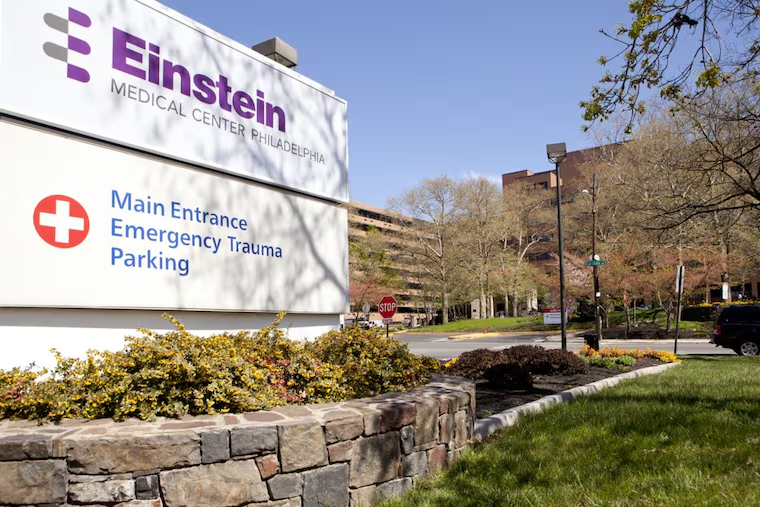In its latest merger, Thomas Jefferson aims to add Einstein Healthcare
Thomas Jefferson University is continuing its acquisition spree, announcing a preliminary deal to add Einstein Healthcare Network. The acquisition would give Jefferson 18 hospitals, up from three before CEO Stephen K. Klasko launched his consolidation campaign.

Thomas Jefferson University has struck a preliminary deal to acquire Einstein Healthcare Network, marking the sixth acquisition by Jefferson since chief executive Stephen K. Klasko took over in 2013 and one that would reunite all but one of the components of the former Jefferson Health System.
Klasko on Tuesday called Einstein,with hospitals in North Philadelphia and East Norriton, Montgomery County, the "missing piece" in his bid to create a health system with "the kind of scale where we could become the place that starts to get care out to where people are."
"The way health care is being financed is being changed 180 degrees," Klasko said, maintaining that Jefferson's growing size will be an advantage going forward. "We're going to be a very big winner in this."
Driving consolidation nationwide is the belief that insurers are changing the way they pay for health care, going from a system that pays based on the amount of care provided to one that pays for results. That is expected to put more financial risk on health systems. A popular way to deal with that risk is by spreading it over more patients through consolidation.
But the deal poses major risks for Jefferson, which would grow from three to 18 hospitals with Einstein, and like many systems, struggles to get better prices from insurers.
In a series of deals, Jefferson, based in Center City, has expanded its reach throughout much of the Philadelphia region. It acquired Abington Health in 2015 and Aria in 2016. Philadelphia University and Kennedy Health followed last year. In addition, Jefferson bought a controlling stake in Rothman Orthopaedic Specialty Hospital, in Bensalem. This year, Jefferson completed its deal for Magee Rehabilitation Hospital.
Main Line Health is the former Jefferson Health System component that remains independent.
Including Einstein, Jefferson would be approaching $6 billion in annual revenue. The University of Pennsylvania Health System is at about $7.8 billion in annual revenue, including the recently acquired Princeton HealthCare System and Penn's medical school.
If Einstein, which celebrated its 150th anniversary in 2016, reaches a definitive agreement to become part of Jefferson, that will end years of wrestling with the possibility of throwing its lot in with a larger organization. The nonprofit has a hard time operating profitably because 70 percent of its revenue comes from Medicare and Medicaid, government programs that don't pay as well as private insurance.
Temple University Hospital is in a similar position of serving a largely poor patient population of North Philadelphia and being in constant conversations with potential partners. Temple officials declined Tuesday to comment on what an Einstein-Jefferson deal might mean for Temple.
Stuart H. Fine, a professor of health policy and management at Temple University's College of Public Health, wondered whether Jefferson and Einstein were "committed to staying on North Broad Street, where there is no room for both Temple and Einstein in their current forms."
Einstein had additional suitors but chose Jefferson because of a similar approach to the health-care market, said Barry Freedman, Einstein's chief executive, who plans to stay during a transition and integration.
"We need to redefine the way patient care is delivered in a major metropolitan market," he said. "They are committed to the underserved, as are we, which was an important element and of course their size and scale and financial well-being will give Einstein opportunities for growth and expansion that we could not do on our own."
The deal would bring together two leading rehabilitation hospitals, Magee, in Center City, and MossRehab, in Elkins Park. "The ability to coordinate if not integrate rehabilitation services will translate into better quality, better research, and better access," Freedman said.
In the first half of the fiscal year that ends June 30, Jefferson had an operating loss of $27.9 million, but Freedman said he was convinced that Jefferson will make needed changes. "We've looked at that carefully," he said.
Standard & Poor's and Moody's, two major credit rating agencies, recently reviewed Jefferson's operations and both noted the challenges of translating Jefferson's expansion from three hospitals to 14 since 2015 to better financial performance. Neither ratings agency considered the acquisition of Einstein, which had an operating loss of $23 million in fiscal 2017 and whose credit rating was recently downgraded to "junk" by Fitch.
Klasko said Jefferson was in the midst of an integration that includes a massive and costly consolidation of electronic medical records, which is crucial to getting patients to the right place in the network.
"That integration takes incredible investment. It's not just IT," Klasko said. "The fact is that even as we increase our revenues, which we will continue to do, we're not going to have the breakout net operating income while we're doing all that investment."